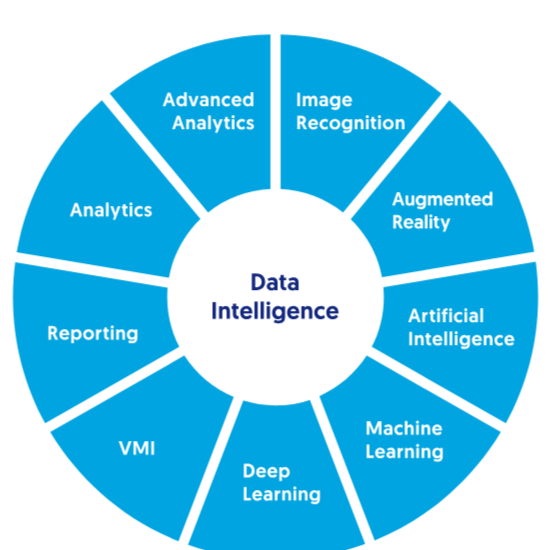- February 21, 2024
- Posted by: SouTech Team
- Category: Others

- Introduction
In the rapidly changing business environment, maintaining a competitive edge demands more than mere intuition. It demands a deep understanding of the vast amounts of data at your disposal. Welcome to the realm of Data Intelligence, where businesses elevate their IQ through strategic analysis.
- Understanding Data Intelligence
2.1 What is Data Intelligence?
At its core, Data Intelligence involves collecting, processing, and analyzing data to derive actionable insights. It goes beyond raw data to provide a comprehensive understanding of patterns, trends, and correlations.
2.2 The Role of Data Analysis
Data analysis is the heartbeat of Data Intelligence. It involves scrutinizing data to uncover meaningful information, enabling businesses to make informed decisions.
- Benefits of Data Intelligence
3.1 Informed Decision-Making
One of the primary benefits of Data Intelligence is empowering decision-makers with accurate and timely information, leading to better choices and outcomes.
3.2 Enhanced Operational Efficiency
Efficiency skyrockets when operations are guided by data-driven insights. From resource allocation to process optimization, every aspect of business stands to benefit.
- Implementing Data Intelligence
4.1 Choosing the Right Tools
Selecting the appropriate tools is crucial. From advanced analytics platforms to user-friendly visualization tools, the market offers a range of solutions.
4.2 Building a Data-Driven Culture
Implementation goes beyond technology. Fostering a culture that values and utilizes data is key to success.
- Challenges in Data Intelligence
5.1 Data Security Concerns
As the volume of data grows, so do concerns about security. Robust measures are essential to safeguard sensitive information.
5.2 Overcoming Resistance to Change
Employees may resist the shift to a data-centric approach. Effective change management strategies are necessary.
- Successful Case Studies
6.1 How Company X Leveraged Data Intelligence
Explore a real-world example of a company that transformed its operations through Data Intelligence.
6.2 Lessons Learned from Company Y’s Data Journey
Discover the valuable lessons learned by another organization on their data intelligence journey.
- Future Trends in Data Intelligence
7.1 Artificial Intelligence Integration
The future lies in the integration of artificial intelligence, enabling machines to learn and adapt, enhancing the predictive capabilities of data intelligence.
7.2 Predictive Analytics Advancements
Anticipate future trends by leveraging the advancements in predictive analytics, a cornerstone of evolving data intelligence.
- Tips for Maximizing Your Business IQ
8.1 Continuous Learning and Adaptation
The landscape of data intelligence evolves. Stay ahead by fostering a culture of continuous learning and adaptation.
8.2 Collaboration and Cross-Functional Insights
Break down silos within your organization. Collaborate across functions to gain holistic insights from diverse perspectives.
- Measuring the Impact of Data Intelligence
9.1 Key Performance Indicators (KPIs)
Define and measure key performance indicators to assess the impact of data intelligence on your business objectives.
9.2 Evaluating Return on Investment (ROI)
Understand the tangible benefits by evaluating the return on investment in your chosen data intelligence tools.
- Overcoming Common Misconceptions
10.1 Data Intelligence vs. Big Data
Clarify the distinction between data intelligence and big data, debunking common misconceptions.
10.2 Addressing Data Overload Concerns
Too much data can be overwhelming. Learn strategies to navigate the balance between information abundance and practical usability.
- Conclusion
In conclusion, Data Intelligence is the compass guiding businesses through the complex landscape of data. Elevate your business IQ, make informed decisions, and stay ahead of the competition.
- FAQs
12.1 What is the difference between data intelligence and business intelligence?
Business intelligence focuses on data analysis for strategic decision-making, while data intelligence extends to the broader scope of understanding and utilizing data comprehensively.
12.2 How can small businesses benefit from data intelligence?
Small businesses can leverage data intelligence to streamline operations, target their audience more effectively, and make informed decisions on a budget.
12.3 Are there any ethical considerations in data intelligence?
Ethical considerations include ensuring data privacy, transparency in data usage, and avoiding biases in analysis to maintain integrity in data intelligence practices.
12.4 What are the key features to look for in data intelligence tools?
Key features include user-friendly interfaces, scalability, security measures, and integration capabilities with existing business systems.
12.5 Can data intelligence be applied to non-profit organizations?
Absolutely. Non-profits can harness data intelligence to optimize resource allocation, measure the impact of their initiatives, and enhance their overall efficiency.





